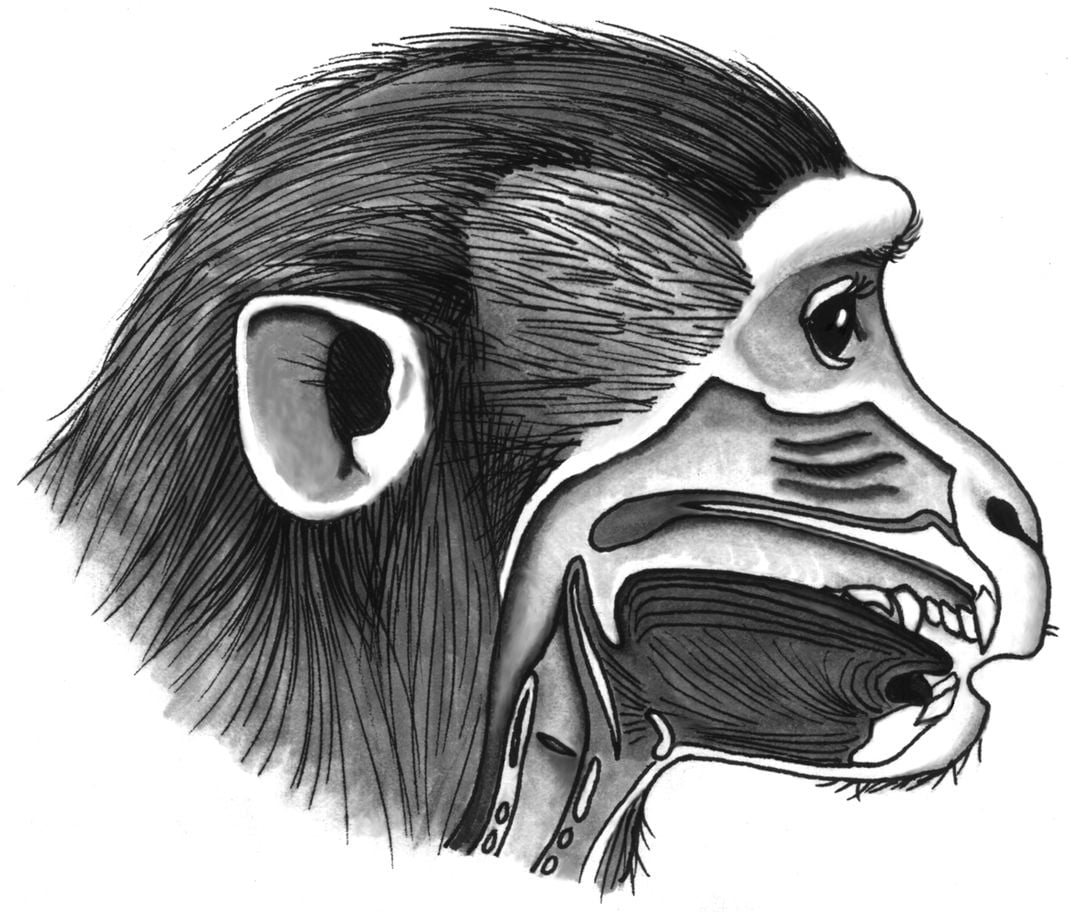What’s Really Keeping Monkeys From Speaking Their Minds? Their Minds
When it comes to language, primates have all the right vocal equipment. They just lack the brains
/https://tf-cmsv2-smithsonianmag-media.s3.amazonaws.com/filer/b7/7f/b77f6f02-11c7-47e6-a9ad-9fbdc5fc0cad/bt05px.jpg)
In the Disney film The Jungle Book, King Louie the ape announces that he is “tired of monkeying around.” "I want to walk like you, talk like you,” he croons to the child Mowgli, in a bid to persuade him to reveal the secret of making fire. “You see it's true, an ape like me can learn to be like you, too.” Outside of Disney, a monkey talking like a man may sound a bit far-fetched. But actually, scientists are finding that primates have all the right stuff for speech—except one crucial component.
Since the days of Darwin, scientists have debated what exactly is preventing non-human primates from speaking “like us.” After all, they share our ability to use tools, can learn basic sign language and in some cases even demonstrate a sense of self-awareness. This question has important implications for how and when speech evolved in humans: Was the anatomical structure already there for our brains to co-opt for language, or did it take significant evolution in earlier hominids to unlock the key to the spoken word?
A study published Friday in the journal Science Advances sheds new light on this debate. By x-raying macaques while they vocalized different sounds and then analyzing the various shapes their vocal cords can make to estimate what speech-like sounds those shapes could produce, University of Vienna biologist W. Tecumseh Fitch says he and his co-authors have proven that primates lack only the cognitive ability to speak, not the physical one.
"I certainly hope this paper lays that myth to rest," Fitch says of what he calls the "tiring" trope repeated in textbooks and popular science literature: that monkeys can't physically speak. On an evolutionary scale, Fitch’s results also suggest that the groundwork for speech could have existed before humans even evolved—and that it took solely the evolution of a our particular neural wiring to take full advantage of those vocal cords.
"Speech isn't just something that arises because you have a vocal tract and can make the sounds," says Mark Pagel, an evolutionary biologist at the University of Reading who wasn’t involved in the study. "It's an enormously powerful thing, language, but it's extremely costly and it requires a lot of neural power."
Pagel says he also hopes Fitch's will close the door on debates about the speech-worthiness of primate throats, and allow people to focus on other more interesting questions—particularly how sophisticated the rudimentary languages of non-human animals might actually be. He recalled a 1980 Science study in which biologists were able to determine that vervet monkeys used three distinct calls to warn each other about different kinds of predators approaching.
"I think we're going to find that animal communication is far more nuanced than even those three ‘words,’" Pagel says.

Fitch's study replicates the methods of a 1969 Science study done by his doctoral adviser, Brown University cognitive scientist Philip Lieberman, in which plaster casts were taken of the vocal cords of dead macaques and used to analyze the potential frequencies for speech. Today, Lieberman says that he finds Fitch's work to be a "nice replication" of his previous study that finds a greater range of possible vowels. However, he adds that his former student doesn't consider the "quality" of speech that the macaques would be able to produce.
For example, the new study glossed over the fact that the macaques didn't produce the vowel sound found in the word "beet," Lieberman says. That vowel sound—along with a handful others such as those in the words "ma" and "do"—have been shown to play a key role in allowing humans to understand each other speak, he says. "If apes had a human brain, they could talk," Lieberman says, "but with reduced intelligibility."
Durham University anthropologist Adriano Reis e Lameira also takes issue with the study, saying that Fitch and his co-authors overlooked research Lameira conducted suggesting that some primates are actually able to learn calls with human-like vowels and consonants. "Our closest relatives can vocally learn new vowel-like and consonant-like calls, both in the wild and in captivity," Lameira says. "The authors completely avoid referencing these data and sweep it under the rug."
Fitch, however, is confident in his results. Next, he’s planning to extend his research on speech capacity to another intriguing creature: human infants.
For babies, he and his colleagues hope to study the same question: is it just their brains holding them back from speaking, or both the brain and vocal cords? “A similar claim has been made that a newborn infant couldn’t make enough for speech based on similar logic,” Fitch says. He says he has x-rays of newborn infants vocalizing that could be used to do a similar analysis of potential vowel sounds that could be produced, and sees studying little humans as a natural continuation of research into the origins of languages.